|
|
|
Sort Order |
|
|
|
Items / Page
|
|
|
|
|
|
|
| Srl | Item |
| 1 |
ID:
174651


|
|
|
|
|
| Summary/Abstract |
Will the rise of China, an authoritarian, party-state with a poor record of protecting its citizens’ human rights, undermine humanitarian intervention? This question has been particularly pertinent since China’s “assertive turn” in foreign policy. Drawing on the case of Chinese reactions to the humanitarian crisis in Syria, this article argues that China’s attitude toward humanitarian intervention remains ambiguous and contradictory. While China has at times prevented the UN Security Council from threatening sanctions on Syria, it has not necessarily denied that a humanitarian crisis exists. The article shows that the People’s Republic of China is beginning to act more as a norm maker than norm taker, and is offering its own vision of humanitarian intervention, coined as “responsible protection.”
|
|
|
|
|
|
|
|
|
|
|
|
|
|
|
|
| 2 |
ID:
057958
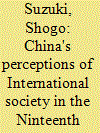

|
|
|
| 3 |
ID:
089508
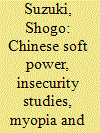

|
|
|
|
|
| Publication |
2009.
|
| Summary/Abstract |
This article is critical of a series of works on Chinese soft power which have garnered much attention in recent years. These works typically portray Chinese soft power, characterised by its disregard for Western models of development that propagate 'democratic governance', as a latent threat to global order. The article argues that such claims are premature, and to date there is little evidence of a systematic attempt by the Chinese to propagate a 'Beijing model' of autocratic development. These claims are substantiated by analysing China's participation in United Nations peacekeeping operations in Africa, which are characterised by mandates aimed at transforming war-torn states into liberal democracies. I suggest that China's participation in these operations is a crucial component of its 'charm offensive' aimed at the West, and designed to allay fears of a 'China Threat'. The article argues that Chinese understandings of soft power are diverse and directed at multiple audiences. The tendency to 'look for potential threats' in many Western policy-informed works, however, ignores the multifaceted nature and diverse views on Chinese soft power, and clouds our ability to understand this new phenomenon in Chinese foreign policy
|
|
|
|
|
|
|
|
|
|
|
|
|
|
|
|
| 4 |
ID:
105175
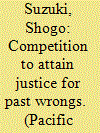

|
|
|
|
|
| Publication |
2011.
|
| Summary/Abstract |
This article joins the debate on transnational campaigns for Japanese historical wrongs in the Asia-Pacific by highlighting the collective "forgetting" on the part of the victims' society. Focusing on the Taiwanese "comfort women" issue, I argue that the "comfort women" campaign has been overshadowed by identity politics in Taiwan, and has subsequently lost ground to civil society debates about the KMT's repressive past. In the context of democratization and a growing political movement to emphasize a Taiwanese identity, I argue that a Chinese Other has been constructed to emphasize the island's distinctiveness from China. This, however, has entailed drawing attention to historical wrongs committed by the Nationalist Party (Zhongguo guomindang, or KMT) during Chiang Kai-shek's authoritarian rule, as well as the emergence of a new historical narrative that emphasizes (relatively) benign Japanese colonial rule. This has had the unintended effect of drawing greater societal attention towards party political disputes over Taiwan's national identity and how history should be interpreted, rather than the redress for the former "comfort women."
|
|
|
|
|
|
|
|
|
|
|
|
|
|
|
|
| 5 |
ID:
189257
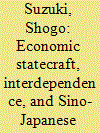

|
|
|
|
|
| Summary/Abstract |
China’s increasingly active economic diplomacy in recent years has often been deeply linked to its geostrategic interests. Japan is said to be watching this development with alarm. Analysts have often claimed that this has resulted in Sino-Japanese rivalry, where the Japanese see any gains made by China in zero-sum terms, and make concerted efforts to counter China’s growing influence. This article, however, is critical of such views. While elements of rivalry may indeed be visible in some aspects of Sino-Japanese relations, it would be premature to apply this perspective to economic statecraft, which is inherently multifaceted. This article claims that too much attention has been paid to the strategic aspects of Chinese economic statecraft at the expense of economic/commercial ones that could foster cooperative relations between Beijing and Tokyo. It argues that Japan does not hold a monolithic view that Chinese diplomatic activities in the economic realm are an axiomatic threat to Japanese security interests, and it remains premature to say that Japan and China are ‘rivals’ in the realm of economic statecraft. Future analysis in this area needs to pay greater attention to the complicating effects that economic interdependence can have in strategic policies.
|
|
|
|
|
|
|
|
|
|
|
|
|
|
|
|
| 6 |
ID:
076780
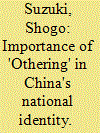

|
|
|
|
|
| Publication |
2007.
|
| Summary/Abstract |
Recent studies have increasingly argued that the Chinese leadership uses Japan's imperialistic past as a tool for domestic and political bargaining. However, this argument fails to appreciate the embedded nature of negative memories within China. This article forwards an alternative argument by situating Japanese militaristic history within Chinese national identity. By examining a wide range of Chinese primary sources often underutilized by International Relations (IR) analysts, it moves beyond narrow, elite-centred explanations. The article argues that modern China's national identity has been characterized by an acute sense of 'victimhood' arising from its turbulent interactions with International Society, and that Japan plays an important role as an 'Other' which enhances China's self-image as a 'victim'. Furthermore, it claims that Japan's emergence as an 'Other' in China's national identity is a by-product of China's attempts to regain its social and moral legitimacy within a post-Cold War International Society increasingly dominated by the Western powers. By highlighting the deeply entrenched nature of Japanese imperialist history in China's national identity, the article also shows that history is more than just part of a 'toolkit' that can be rationally utilized by the political elite, and that states are moral agents that are deeply affected by history.
|
|
|
|
|
|
|
|
|
|
|
|
|
|
|
|
| 7 |
ID:
167600
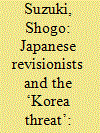

|
|
|
|
|
| Summary/Abstract |
This article contributes to the debate on Japanese security. Drawing on insights from ontological security, it challenges conventional understandings that China and North Korea are Japan’s main security threats. It argues that South Korea poses a powerful threat to the Japanese right-wing revisionists’ perception of Japan. The revisionists have attempted to secure Japan’s identity from the ‘Korea threat’ by labelling South Korea a ‘non-democracy’, and this tactic has been taken up by the Japanese government as well. The article concludes by pointing out that such moves could unwittingly result in the emergence of security dilemmas between the two main democracies in Northeast Asia.
|
|
|
|
|
|
|
|
|
|
|
|
|
|
|
|
| 8 |
ID:
061237


|
|
|
| 9 |
ID:
169241


|
|
|
| 10 |
ID:
137143


|
|
|
|
|
| Summary/Abstract |
Since 1945, the United States (US) has served as a focal point of both Left-wing and Right-wing Japanese nationalism. Both sides argued that the US was an arrogant hegemon that unjustly robbed Japan of its autonomy, and prevented Japan from achieving its own ideal national identity. Both sides frequently demanded that Japan should be more ‘resolute’ and resist unfair demands emanating from the US. In recent years, however, both camps are increasingly using the same rhetoric to criticise the Japanese government's China policy. China is also being depicted as an overbearing state that unfairly browbeats Japan into making diplomatic concessions. Given the similarities between the portrayal of China and the US, has China now become a nationalist focal point for both the Japanese Left and Right? Utilising constructivist insights, this article seeks to shed light on this question, by examining how the Japanese Right and Left portray China, and explores the implications for Japan's China policy.
|
|
|
|
|
|
|
|
|
|
|
|
|
|
|
|
| 11 |
ID:
130417
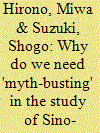

|
|
|
|
|
| Publication |
2014.
|
| Summary/Abstract |
The literature on Sino-African relations has debated whether or not China's growing presence is a threat to Western or African interests, and has come to the conclusion that China's behavior is not uniquely immoral. Many countries, including Western liberal democracies, similarly give aid to local autocrats to secure natural resources. Why, then, has so much effort been made to come to this perhaps unsurprising conclusion? We argue that the literature on Chinese foreign policy remains heavily influenced by Western states' policy interests, resulting in an impoverished debate that is primarily concerned with the idea of a China threat. In order to recover the diversity in our research on Chinese foreign policy, we argue for the need to go beyond the confines of Western strategic interests.
|
|
|
|
|
|
|
|
|
|
|
|
|
|
|
|
| 12 |
ID:
108078


|
|
|
|
|
| Publication |
2011.
|
| Summary/Abstract |
Why does China continue to participate in highly intrusive peacekeeping operations which, it can be argued, suspend the sovereignty of the host state and attempt to transform it into a liberal democratic, market capitalist state? This article highlights the significant role of Chinese paternalism in providing the ideological justification for intervening in states' domestic affairs. Focusing on the quasi-official annual publication, the China Modernization Report, and its discourses on development, this article contends that some Chinese discourses interpret modernization as a linear and universal process, and interpret different stages of development in distinctly hierarchical terms. This places China as superior vis-à-vis many underdeveloped states. Such notions of 'superiority', in turn, lead to paternalistic thinking that justifies China (and other relatively 'developed' states) intervening in underdeveloped states and societies in order to 'guide' them to the path of 'development'.
|
|
|
|
|
|
|
|
|
|
|
|
|
|
|
|
|
|
|
|
|